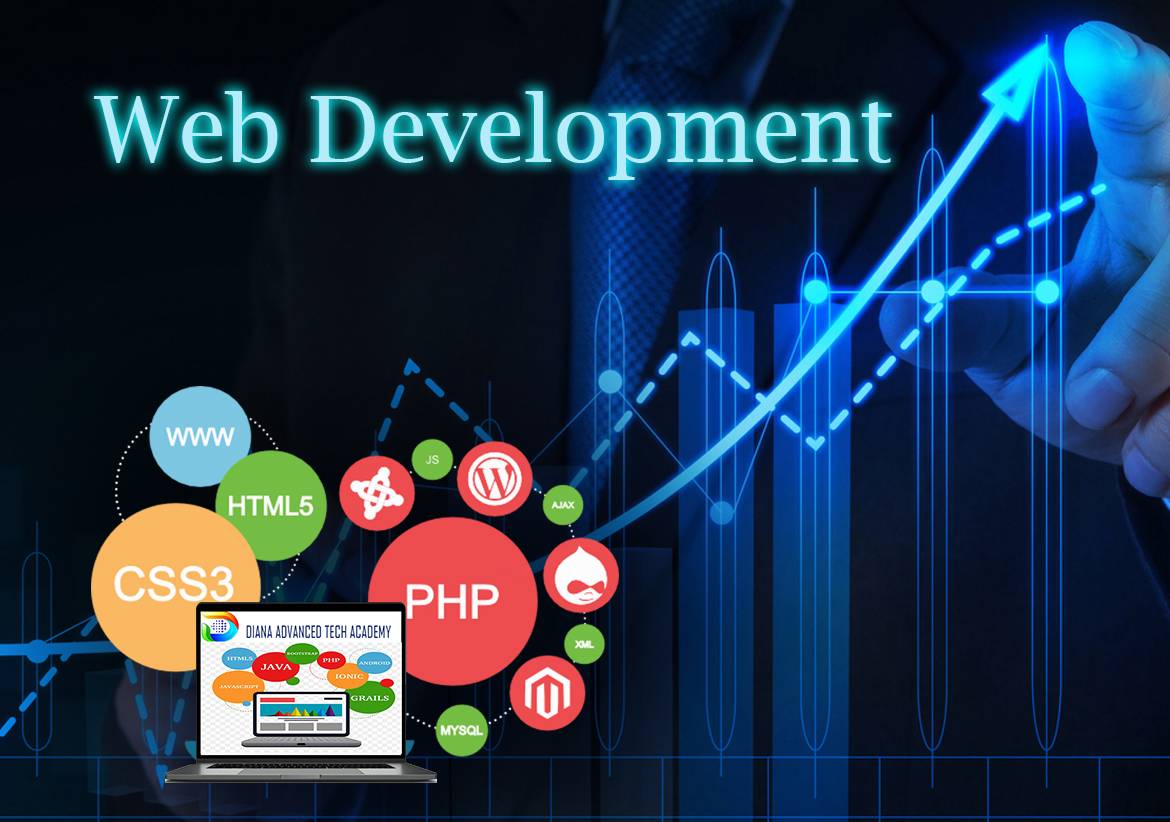Diana’s HTML CSS Ultimate Master Certification
Overview
The HTML CSS Ultimate Master Certification is an advanced program designed to provide comprehensive knowledge and expertise in HTML and CSS. It is an in-depth course that covers various advanced topics and techniques in web development using HTML and CSS. Here is an overview of what you can expect from the HTML CSS Ultimate Master Certification:
1. HTML Fundamentals:
– A thorough understanding of HTML syntax, tags, attributes, and elements.
– Semantic HTML and its importance for accessibility, search engine optimization, and structured content.
2. CSS Styling and Layout:
– Advanced CSS techniques for styling web pages, including selectors, properties, and values.
– Proficiency in creating complex layouts using CSS box model, floats, positioning, and flexbox.
3. Responsive Web Design:
– Techniques and best practices for creating responsive and mobile-friendly websites.
– Media queries and viewport settings to adapt the design to different screen sizes and devices.
4. CSS Preprocessors:
– Working with CSS preprocessors such as Sass or Less to improve productivity and maintainability of CSS code.
– Understanding variables, mixins, nesting, and other advanced features of CSS preprocessors.
5. CSS Frameworks:
– Utilizing popular CSS frameworks like Bootstrap or Foundation to streamline development and create responsive, feature-rich websites.
– Customizing and extending CSS frameworks to meet specific project requirements.
6. CSS Animations and Transitions:
– Creating captivating animations and transitions using CSS keyframes, transitions, and transforms.
– Understanding timing functions, animation properties, and performance considerations for smooth animations.
7. CSS Grid Layout:
– Mastery of CSS Grid for creating advanced and flexible page layouts.
– Implementing grid-based designs and handling grid alignment, spanning, and positioning.
8. CSS Architecture and Organization:
– Developing scalable and maintainable CSS codebases using modular CSS methodologies like BEM or SMACSS.
– Implementing CSS naming conventions, file structuring, and optimization techniques.
9. CSS Variables and Custom Properties:
– Understanding and using CSS variables to create reusable and dynamic styles.
– Manipulating CSS variables with JavaScript to create responsive and interactive designs.
10. CSS Optimization and Performance:
– Techniques for optimizing CSS code and improving page load times.
– Minification, file concatenation, code splitting, and other strategies for CSS performance optimization.
11. Web Typography:
– Advanced typography techniques, including web fonts, font stacks, text effects, and typographic hierarchy.
– Implementing custom fonts and optimizing typography for different devices and screen resolutions.
12. Cross-Browser Compatibility:
– Strategies for handling browser compatibility issues and ensuring consistent rendering across different browsers.
– Understanding browser-specific CSS features, vendor prefixes, and fallback techniques.
13. CSS Grid Systems:
– Working with CSS grid systems to create responsive grid-based layouts.
– Understanding grid frameworks and their integration into web projects.
14. Debugging and Troubleshooting:
– Advanced debugging techniques for identifying and resolving HTML and CSS issues.
– Utilizing browser developer tools, code validators, and other debugging resources.
15. Web Performance Optimization:
– Advanced techniques for optimizing website performance, including asset optimization, lazy loading, and caching strategies.
– Performance profiling and analysis to identify and resolve bottlenecks.
Prerequisites
The HTML CSS Ultimate Master Certification is an advanced course, and while there are no strict prerequisites, having a solid foundation in HTML and CSS is highly recommended. Here are some prerequisites that will help you make the most of the course:
1. Basic HTML Knowledge: Familiarity with HTML markup, including understanding tags, attributes, and their usage to create structured web pages.
2. Proficiency in CSS: A good understanding of CSS styling concepts, including selectors, properties, values, and how to apply styles to HTML elements.
3. Responsive Web Design: Basic knowledge of responsive web design principles and techniques, including media queries and viewport settings.
4. Web Development Fundamentals: Familiarity with fundamental web development concepts such as the client-server architecture, HTTP protocol, and how web pages are rendered in browsers.
5. Text Editor: Comfortable using a text editor or an integrated development environment (IDE) to write and edit HTML and CSS code.
6. Basic JavaScript: While not mandatory, having a basic understanding of JavaScript will be beneficial as it is often used to enhance interactivity and functionality in web development.
Audience
The HTML CSS Ultimate Master Certification is designed for individuals who already have a solid understanding of HTML and CSS and want to take their skills to an advanced level. The course is suitable for the following audience:
1. Experienced Web Developers: Web developers who have been working with HTML and CSS for some time and want to expand their knowledge and skills in advanced web development techniques.
2. Frontend Developers: Frontend developers who want to enhance their proficiency in HTML and CSS and learn advanced techniques for creating complex layouts, animations, and responsive designs.
3. UI/UX Designers: Designers who want to gain a deeper understanding of how HTML and CSS can be used to implement their design concepts effectively. This course will provide insights into the technical aspects of web development and help designers create more feasible and functional designs.
4. Web Development Professionals: Professionals in the web development field who want to stay updated with the latest advancements in HTML and CSS and learn best practices for building modern, performant, and accessible websites.
5. Freelancers and Entrepreneurs: Freelancers or entrepreneurs who handle their own web development projects and want to improve their HTML and CSS skills to create high-quality, professional websites.
6. Career Switchers: Individuals transitioning into web development from other fields who already have a basic understanding of HTML and CSS. This course will help them level up their skills and gain the necessary expertise to pursue a career in frontend development.
SkillSet
The HTML CSS Ultimate Master Certification aims to equip you with an advanced skill set in HTML and CSS. By completing the course, you will develop the following skills:
1. Advanced HTML Markup:
– Ability to create complex and well-structured HTML documents using semantic tags and advanced HTML features.
– Understanding of HTML5 elements, forms, multimedia, and APIs.
2. CSS Styling Techniques:
– Proficiency in applying advanced CSS styling techniques, including selectors, pseudo-classes, pseudo-elements, and combinators.
– Mastery of CSS properties, values, and units to create custom styles and achieve specific design requirements.
3. Advanced Layout Techniques:
– Ability to create complex and responsive layouts using CSS positioning, floats, CSS Grid, and Flexbox.
– Understanding of the CSS box model, margins, padding, and borders for precise control over element positioning and spacing.
4. CSS Animation and Transition:
– Skill in creating advanced animations and transitions using CSS keyframes, timing functions, and transforms.
– Ability to apply animations to various elements and achieve smooth and engaging visual effects.
5. CSS Frameworks and Preprocessors:
– Familiarity with popular CSS frameworks like Bootstrap or Foundation, and knowledge of their components, grid systems, and customization options.
– Understanding of CSS preprocessors (such as Sass or Less) and their usage to enhance productivity and maintainability.
6. Responsive Design Principles:
– Proficiency in creating responsive designs that adapt to different screen sizes and devices using media queries and responsive units.
– Ability to optimize images, handle breakpoints, and create fluid layouts for optimal user experience across devices.
7. Cross-Browser Compatibility:
– Understanding of cross-browser compatibility issues and knowledge of techniques to ensure consistent rendering across different browsers.
– Familiarity with browser-specific CSS features, vendor prefixes, and fallback strategies.
8. Performance Optimization:
– Proficiency in optimizing HTML and CSS code for improved website performance, including file minification, code optimization, and caching strategies.
– Knowledge of performance profiling tools and techniques to identify and resolve performance bottlenecks.
9. Web Accessibility:
– Understanding of web accessibility guidelines and techniques for creating accessible websites.
– Knowledge of semantic HTML, ARIA attributes, and WCAG standards to ensure inclusivity and usability for all users.
10. Debugging and Troubleshooting:
– Ability to debug and troubleshoot HTML and CSS issues using browser developer tools, code inspection, and validation techniques.
– Proficiency in identifying and resolving compatibility issues, layout problems, and CSS conflicts.
11. Version Control and Collaboration:
– Experience with version control systems (such as Git) for managing and collaborating on HTML and CSS projects.
– Understanding of branching, merging, and collaboration workflows to work effectively in team environments.












































